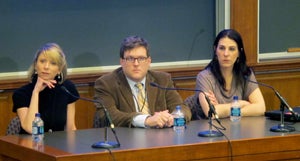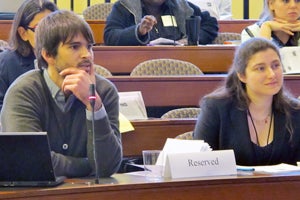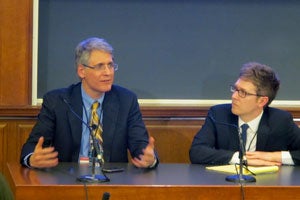While equality is a fundamental principle of American law and the bedrock of the national psyche, inequality has actually increased in the past four decades in the distribution of wealth, power, opportunity, even health. Yet the topic of inequality has received relatively little attention from legal theorists, and, for the most part, it is ignored in the basic law school curriculum.
A conference last month at HLS, “The Psychology of Inequality,” presented by the Project on Law & Mind Sciences (PLMS), stepped into that vacuum, bringing together scholars, law students, and others to examine inequality from the standpoint of the latest research in social science, health science, and mind science, and to reflect on the implications of their findings for law. The HLS Student Association for Law and Mind Sciences (SALMS), together with a group of roughly 20 students, were instrumental in organizing the conference.

“Inequality matters in ways that are not commonly understood, including in how people see and make sense of the world,” says Jon Hanson, the Alfred Smart Professor of Law and Director of PLMS. “Indeed, the way people respond to instances of inequality – either by equalizing, or by rationalizing – appears to be a very significant factor in how they view markets, regulation, and many important policy and social issues. So when we engage in policy debates, mustering all our best arguments and evidence in favor of a given policy conclusion we shouldn’t be perplexed when our opponent doesn’t budge,” says Hanson. “Such recalcitrance on both sides of a discussion often reflects, not the inadequacy, but the irrelevance, of the reasons being exchanged. Behind it all may be a conflict between largely subconscious urges: some people would rather rationalize inequality while others lean toward equalizing.”

Hanson was one of more than a dozen scholars who spoke at the Feb. 26 conference, the fifth annual conference by PLMS, founded by Hanson six years ago to promote interdisciplinary exchange and collaboration between the mind sciences and the legal community. PMLS supports research, writing and conferences in order to dislodge the prevailing “dispositionist” approach of law – which holds that human beings, for the most part, make rational choices based on logical preferences – in favor of a “situationist approach.” Situationsim recognizes that social sciences and mind sciences, including social psychology, social cognition, and cognitive neuroscience, have repeatedly demonstrated that human behavior is influenced by countless factors ignored by the dispositionist approach, which collectively are known as “situation.”
Jaime Napier, an assistant professor of psychology at Yale University, presented her research on the ways in which high-status and low-status groups differ in their rationalizations of inequality. High-status people tend to place blame on individuals for their lot in life, while low-status people tend to see theirs as the natural order of things. Eric Knowles, an assistant professor of psychology and social behavior at the University of California, Irvine, discussed his theory of “malleable ideologies,” through which different groups with a same core ideology – say, “life is sacred” – can come to different outcomes on issues such as abortion or the death penalty. Adam Benforado ’05, a former student of Hanson’s and an assistant professor at the Earl Mach School of Law at Drexel University, presented on the mind-body connection in decision-making, including how seemingly innocuous environmental influences such as room temperature might have significant influence on decisions made by juries and judges. Ichiro Kawachi, a Professor of Social Epidemiology and Chair of the Social/Behavioral Sciences Department at the Harvard School of Public Health, discussed research showing that people of lower social status lead shorter, sicker lives, while other speakers discussed ways that social disparities influence health, how even young children favor high-status individuals, and the drive among humans to view the world as essentially fair.
In addition to national experts in the areas of health, psychology, and mind sciences, a number of HLS faculty contributed to the discussion from their areas of expertise in a panel discussion (see video below), including John Palfrey ’01, the Henry N. Ess III Professor of Law and Vice Dean for Library and Information Resources, an expert on the internet; Lucie White ’81, the Louis A. Horvitz Professor of Law, who specializes in poverty law and international economic and social rights; Robert C. Bordone ’97, the Thaddeus R. Beal Clinical Professor of Law and Director of the Harvard Negotiation & Mediation Clinical Program; Stella Burch Elias, a Climenko Fellow and Lecturer on Law and Andrew Woods ’07, a Climenko Fellow and Ph.D. candidate in politics at Cambridge University.
In that discussion, Hanson shared some provocative ideas. The good news, he said, is that humans have an egalitarian impulse, so that inequality causes them discomfort; some resolve the conflict by redistributing so that there is more equality, while others rationalize with reasons that explain the inequality. The bad news, Hanson added, is that it’s not terribly hard to move someone away from the equalizing impulse.
“When you experience fear and threat – personal threat, group threat, system threat – you become a hardcore dispositionist,” said Hanson, snapping his fingers, “just like that!”
Within the next several months, edited versions of videos from the conference will be made available on The Project on Law and Mind Sciences website, where you can also find videos of presentations from previous conferences.
PMLS 2011 Conference Presenters:
Ichiro Kawachi, “Is Inequality Damaging to Population Health?”
Laura Kubzansky, “Stress and Reslience: Pathways to Social Disparities in Health”
[view session 1 video]
Kristina Olson, “Young Children’s Understanding of Social Inequality”
Arnold Ho, “The Perception of Biracials and the Maintenance of Group-Based Social Hierarchies”
Aaron Kay, “The Impact of Social Inequality and Fairness Beliefs on Long-Term Goal Pursuit”
[view session 2 video]
Amy Cuddy, “Outcomes of Warmth and Competence Stereotypes”
Eric Knowles, “The Malleability of Ideology”
Jaime Napier, “Essentialism as Rationalization of Inequality among Disadvantaged
[view session 3 video]
Faculty Conferees:
Clinical Professor Robert Bordone ’97, Director of the Harvard Negotiation & Mediation Clinical Program
Climenko Fellow and Lecturer on Law Stella Elias
Professor John Palfrey ’01, Vice Dean for Library and Information Resources
Professor Lucie White ’81
Climenko Fellow Andrew Woods ’07
[view closing panel discussion]
